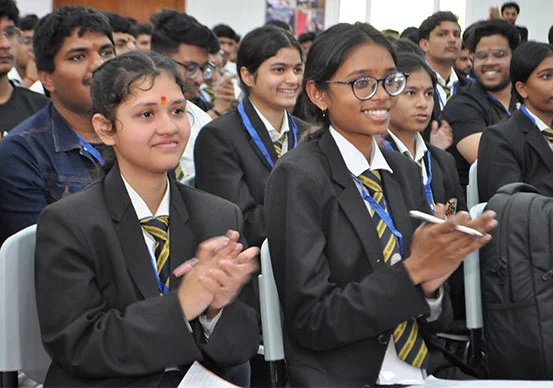
BPT (Bachelor of Physiotherapy)
Duration
4 years + 6 months compulsory internship
Eligibility Criteria
Bachelor of Physiotherapy (BPT) 4 years + 6 months compulsory internship
Passed 10+2 examination with 50% marks in aggregate with Physics, Chemistry and Biology as mandatory subjects.
Secured 50% marks in PCB and should have pass in English as subject.
The Bachelor of Physiotherapy is a comprehensive 4-year degree focusing on physical movement and its prevention.
The program includes in-depth study of anatomy, physiology, pathology, kinesiology, and biomechanics, coupled with practical training and clinical practice. Students learn various therapeutic techniques, such as electrotherapy, acupuncture, hydrotherapy, kinesiology, shockwave therapy, occupational therapy, and speech therapy. They acquire skills to assess, diagnose, and treat musculoskeletal and neuromuscular disorders, creating personalized treatment plans and educating patients on managing and preventing physical disabilities. The program aims to help patients restore or enhance physical function, reduce pain, and improve overall well-being. Graduates are well-equipped to work as clinical practitioners or pursue advanced education and research.
Apply NowAdmissions 2026
Find your path to Success
Curriculum
-
Human Anatomy-I
-
Human Physiology-I
-
Biochemistry
-
Sociology
-
Introduction to Healthcare Delivery System in India
-
Introduction to Yoga- Basic theory
-
Science and techniques
-
Human Anatomy-II
-
Human Physiology-II
-
Basic principles of biomechanics
-
General and clinical psychology
-
Medical terminology and record keeping
-
English, communication and soft skills
-
Basic computer and information sciences
-
Exercise Therapeutics -I
-
Biomechanics and kinesiology
-
Pathology
-
Microbiology
-
Pharmacology
-
Introduction to quality and patient safety (Including Emergency care)
-
BLS
-
Biomedical waste.
-
Environmental Science - I
-
Bio Physics
-
Exercise Therapeutics –II
-
Electrotherapy
-
Medical/Physiotherapy Law and Ethics
-
Environmental Science - II
-
Clinical Orthopedics& Traumatology
-
General Surgery including burns and plastic surgery & Obstetrics and Gynecology
-
General Medicine
-
Pediatrics& psychiatry
-
Community Medicine
-
Diagnostic Imaging for Physiotherapists
-
Clinical Neurology & Neurosurgery
-
Physiotherapy in orthopedics and sports
-
Physiotherapy in General Surgery and medicine
-
Professionalism and values
-
Physiotherapy in Neurology & Psychosomatic disorders
-
Clinical Cardiovascular & Pulmonary
-
Health promotion and fitness
-
Biostatistics & Research Methodology
-
Critique inquiry
-
Case presentation and discussion
-
Physiotherapy in cardiovascular
-
Pulmonary & intensive care.
-
Community Physiotherapy
-
Manual Therapy
-
Sports Physiotherapy
-
Evaluation methods & Outcome Measures
-
Administration and Teaching skills
Career Path
Career path you can choose after the course
Unlock a fulfilling and rewarding healthcare career with a Bachelor in Physiotherapy: hospitals, clinics, rehabilitation centers, sports organizations, schools, and private practices await.
- Physiotherapists in hospitals, rehabilitation centres, and private practices
- Sports physiotherapist for amateur and professional athletes
- Orthopaedic rehabilitation specialist for patients recovering from surgery or injuries
- Geriatric physiotherapist for elderly patients with mobility issues
- Pediatric physiotherapist for children with developmental delays or disabilities
- Occupational health physiotherapist for workplace-related injuries
- Neurological physiotherapist for patients with neurological disorders such as stroke or multiple sclerosis
- Researchers in academia or healthcare institutions
- Rehabilitation manager or director
- Health and safety consultant

Program Educational Objectives PEOS
-
PEO1
Perform functional assessment of different musculoskeletal as well as neuromuscular impairments. Evaluate Posture, postural problems and reeducation of posture.
-
PEO2
Evaluate and recording of joint range of joint motion. Apply joint mobilization and different manipulative techniques on patients having joint disorders or derangements. Evaluate respiratory issues and application of retraining techniques. Strengthen muscles following a different range of musculoskeletal problems.
-
PEO3
Evaluate and grading of muscle strength. Evaluation of work related problems and application of ergonomics.
-
PEO4
Evaluate and training of muscle coordination. Evaluate and training of balance.
Program Outcomes PO’s
-
PO1
Cooperation with other members of the health team.
-
PO2
Sense of responsibility as a team member.
-
PO3
Interpersonal communication skills.
-
PO4
Empathetic attitude towards the patients.
-
PO5
Positive behavioral approach towards patients as well as persons with disabilities.
-
PO6
Decision making independently with respect to the treatment.
-
PO7
Research attitude to rationalize the treatment options.
-
PO8
Importance of referral system.
Program Specific Outcome PSOs
-
PSO1
Evaluate and assess different musculoskeletal, neuromuscular cardiovascular & respiratory and other conditions.
-
PSO2
Evaluate issues and application of retraining techniques. Strengthen muscles following a different range of musculoskeletal problems.
-
PSO3
Evaluate posture, postural problems and reeducation of posture.
-
PSO4
Evaluate and grading of muscle strength, Apply joint mobilization and different manipulative techniques on patients having joint disorders or derangements.









